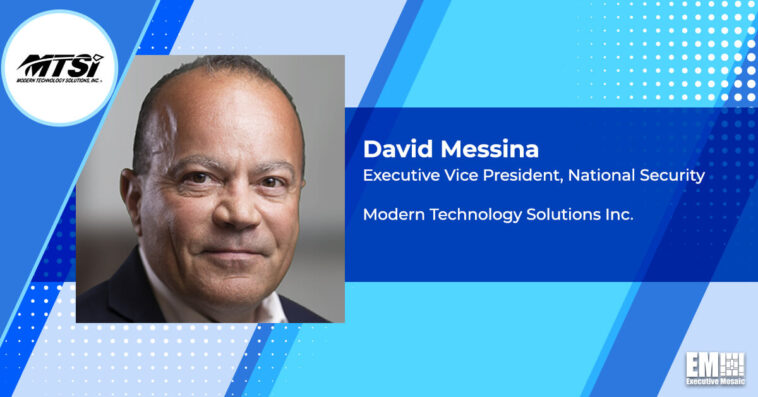One thing that is unmistakable about David Messina is that he loves his company, the engineering and technology services provider Modern Technology Solutions Inc. He believes in the organization’s core values, which include social responsibility and has faith in the 100 percent employee-owned structure, where the team members are the shareholders. Messina has invested in the company’s growth, helping to take MTSI from a small to mid-sized company that has been seeking larger and larger contracts from customers like the Air Force Research Lab, the Missile Defense Agency and U.S. Space Force.
Messina’s interest in serving the federal government dates back to his work with General Electric Aerospace in the 1980s. He started his career in classified space systems, including at Valley Forge, after opting into an employment agreement where he was not told the name of the customer, program or even the building where he was going to work up front.
The executive has performed space and intelligence work ever since, joining MTSI in 2018 as executive vice president of its national security division. In this Spotlight conversation, Messina discussed how to retain valuable talent and the necessity of partnerships with peer companies, as well as highlighted some of MTSI’s cybersecurity strategies, among other topics.
What can you tell us about the company’s recent growth initiatives and how you’re driving value for your customers through contract awards, acquisitions and other aspects across the federal sector?
This is a very impressive company with a 29-year track record with as many years of steady organic growth. It will be 30 years next year and we are planning a big anniversary celebration. Even during down DOD budget years, sequestration, etc., the company still grew. It maybe did not grow quite as fast — but in most other years it grew 15-18 percent — the company has a great track record of consistent organic growth.
I think it comes down to the kinds of programs that we work on being highly technical, usually surrounding research and development and leading-edge problem solving for the customer. Those kinds of programs are usually protected in the budget because it is your future. The other key factor is that the people we hire are just outstanding. We have some very smart people that our customers rely upon to keep these critical programs moving and going in the right direction.
One of the things I wanted to mention is that this is a 100 percent employee-owned company, which makes a really big difference in terms of the type of benefits we offer. Our retention rate with employees is around 93 percent. It has varied between 93 and 95 percent over the years. We have a track record of really exceptional customer CPARS; we have customers going on record giving us exceptional scores.
Following the success of your recent quarterly results, what were the key factors that led to the company-wide performance and how will you continue to work to capitalize on that success moving forward?
We are not a publicly traded company, so we do not report our quarterly earnings, but we do report them to our employees. Our 1600 employees are the shareholders. In fact, we hold multiple in-person meetings a year where we report financial results of the company and our strategy. I think one of the fundamental factors to our success is that the employee owners and our core values really enable our programs to perform in an excellent way, and our customers have come to expect that.
We also attract and retain some really great talent. Sometimes I call this meeting the customer’s unique requirements, like ‘finding the purple unicorn,’ because some of the requirements for skills and expertise are very unique to some of these programs. We have a great internal recruiting team nationwide that does our staffing at every location. We are opening up a new office in San Diego right now, and during the last four weeks I think we have hired 11 or 12 people just for that new contract.
I think another factor in our success is our business development and proposal teams. They really are outstanding. Their processes are fine-tuned and do not overburden the proposal team with a lot of people. Our team can efficiently produce excellent proposals that meet or exceed the customer’s requirements. It is obvious from our win rates because we win almost every one of our recompetes and we have a very high win rate when we target strategic opportunities.
How have recent partnerships been able to assist your company expand its position in the federal marketplace, drive innovation and new capabilities and ultimately help complete your company’s mission?
We really take pride in and spend a lot of time on developing our partnerships in the industry. Companies are your competitors, but they are also your teammates. We develop those relationships and it is a major factor in our growth because as MTSI has moved from a small to a mid-tier company in the last three to five years, we are priming more complex contracts. Our ability to put those teams together and then win the prime contract has been a key factor. And it is all down to relationships and partnerships.
We also team with companies that share our core values. If you look at MTSI’s nine core values on our website, the companies that we work with have very similar values and that promotes a really positive working relationship.
The other thing we have done is work hard to maintain that small company culture as the company has grown over almost 30 years. We avoid bureaucracy while implementing required processes as a federal contractor. I think that keeping the small business culture, recognizing the core values and fully partnering with our employee owners are key aspects.
An important part of a company having strong business ethics in the federal sector is about helping and giving back to the greater community. Can you speak to the various charities and work with other organizations that your company does to make a difference and how people can get involved?
This is something that the company really excels in. We have a 1,600 employee population spread across many locations in the U.S. and we have strong community ties in every location.
First of all, social responsibility is one of our nine core values, which the company and employees take very seriously. But we also created a structure of a charitable giving lead at corporate and at every one of our sites. Those sites are given an annual budget for local employees to pick charitable targets and activities that are important to them in their communities. I think that is a great process and we have a huge involvement from our teams.
A couple of recent charities include America’s VetDogs and Hidden Heroes. There are many more across our MTSI locations. Our teams choose charities related to our key partners and customers, so we sponsor a lot of veteran-related and system engineering education concerns.
What do you see as the most critical challenges facing those in the federal sector as cybersecurity continues to rise in importance and cyber hygiene becomes a necessity for all companies and even more critical at the national security level?
First, I want to define what MTSI does from a cybersecurity perspective. It is pretty unique and highly focused on our customers’ critical problems. We focus on mission critical platforms, weapons systems and cybersecurity. We do not do typical corporate network security, enterprise cybersecurity or defensive network cyber. Those types of things are not the kind of work we do. We have folks who are subject matter experts with strong engineering skills in the domains of air, ground, space and cyber. They have the ability to dive into vulnerabilities, platforms and systems to help our customers solve those problems. This is an area with strong demand from our customers.
We are building a cadre of skilled engineers in this area. We also find that in addition to recruiting cyber engineers, we have training in place to take our skilled system engineers and turn them into cyber system engineers. This is a key initiative for us in the upcoming year.





